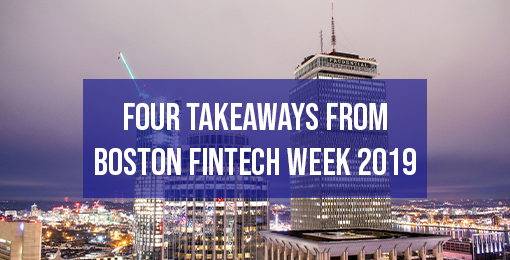As data science, automation, and digital platforms forever alter finance and banking, marketing and PR strategies need to keep pace
While most observers think of Wall Street as the center of finance, it could be argued that the fintech universe revolves around Boston.

The city was home to the first modern mutual fund, Massachusetts Investors Trust, and many of the world’s largest fund managers still reside in Boston, including Fidelity, Putnam, Wellington, Boston Partners and others. Boston also served as the stomping ground of the earliest VC and private equity pioneers, ranging from Peter Brooke and Rick Burnes to Thomas H. Lee and Mitt Romney. And the city, since before Massachusetts even became a state, has been a world-class destination for higher education. A full third of the top 15 universities in the country reside in the greater New England area, while Harvard and MIT, each based in Cambridge, were named the top two universities in U.S. News & World Report’s latest global ranking. Not to be overlooked, Boston’s Route 128 technology corridor usually ranks second to only Silicon Valley as a hub for technology and startup funding.
All of this, of course, creates an ecosystem that represents an ideal sandbox for entrepreneurs in fintech. It also makes Boston Fintech Week a must-attend event for those interested in how technology is altering finance. Similar to last year, BackBay’s fintech team attended as many of panels as possible to digest the latest trends and help connect the dots as to what it all means for marketing and PR professionals. While each of the panels provided compelling insights, here were our four biggest takeaways from the sessions we attended.
As technology changes, the rules of marketing remain the same
Artificial Intelligence, at this point, is everywhere in financial services. An area where many may overlook the impact is in advancing financial wellness. One panel at Boston Fintech Week, The New Financial Health, explored how AI is helping to solve the problem of income inequality.
To be sure, the focus on financial wellness has come to prominence in recent years thanks to growing challenges paying down student debt, buying a first home, planning for retirement, or even setting aside money for an emergency fund. But just as the needs are becoming more pronounced, so too is the opportunity for fintech platforms that can help bridge the wealth gap.
As the moderator Ron Shevlin pointed out throughout the discussion, AI’s potential will revolve around how well these technologies can influence changes in human behavior. It’s one thing to track and manage expenses, but quite another when technology can help “nudge” people toward better decisions that collectively improve their financial wellbeing. It’s a concept that helped economist Richard Thaler win the Nobel Prize in 2017.
The catch, however, is that to change outcomes, the applications themselves need to be adopted and gain critical mass. And with over 2,300 wealth-tech startups competing for attention, funding, and ultimately users (based on data from fintech research firm MEDICI), this is no easy task. It’s even more challenging given the fact that many of the complementary startups across the fintech ecosystem seem to tout similar capabilities.
Success, ultimately, will come down to how well startups can position their solution set through a differentiated story, articulate it clearly and without complication, then share it through a variety of mediums best suited to the desired target audience. — Tylor Tourville, Vice President
Buzzwords: The Bane of Simplicity
The potential benefits of AI across the financial services sector have been drilled into everyone who follows fintech. Greater efficiency, reduced costs, and elimination of manual errors are just a few advantages being promised. One overlooked disadvantage, however, is that for AI to be successful, it needs to be “explainable.” This continues to be a major challenge across the investment universe and was a key theme in the panel, The Potential Impact of AI in Financial Services.
“Explainable AI,” for context, refers to the necessary transparency that provides easy-to-understand insight into how the algorithm or application arrived at its findings. As the panelists noted, while many fintechs claim to leverage AI, very few at this point can deliver a window into how exactly the “black box” works. This blind spot may not carry any repercussions if a music app misfires on a song suggestion, but when institutional investors are making billion-dollar allocation decisions based on AI, they’ll naturally want to “see the math.”
As AI becomes more mainstream in finance – or perhaps before AI can become more mainstream – it needs to become transparent and understandable by those who aren’t data scientists.
So how does all of this relate to marketing? It speaks to the point that there is a growing emphasis on understanding how technology actually works rather than indiscriminately using buzzwords for the sake of being able to hop on a mainstream trend. When it comes to artificial intelligence, in particular, it can be easy to get lost in the minutia behind the science of deep learning and neural network technologies. But if it sounds like nonsense to prospective clients and doesn’t have simple-to-understand data to back it up, it loses all luster to the sales lead. And this speaks to why it’s so important to keep it simple and transparent, even when discussing complex capabilities or concepts. — Cailin Cowley, Senior Account Executive
Trust through thought leadership
Earlier this month, the amount of assets under management (AUM) held by passive ETFs and indexes surpassed the AUM of actively managed funds for the first time ever. While the investment community has seen this shift coming for years, it’s significant a milestone that reflects how much the industry has changed.
The active versus passive investing debate has carried on for decades now, extending back to the 1970s when Burton Malkiel published “A Random Walk Down Wall Street.” Now that it seems passive strategies have officially “won,” the questions facing all investors is how the evolution will change the investing landscape, the impact on the regulatory environment, and how fintech can help fund managers quickly adapt. These, at least, were the questions that panelists sought to answer in the session How Financial Data and Technology are Changing the Rules of Engagement in Financial Engineering, Risk Modeling and Compliance.
The Fed, for instance, has outlined several “unknown” unknowns related to the “passive” shift and its impact on financial stability – from amplified market volatility to the concentration of assets within the industry to the effects on company valuations in addition other potential knock-on effects. The larger point, though, is that as the landscape changes so too will the regulatory lens.
Again, this creates opportunities for fintech firms. But to grow awareness, a content-driven approach can be effective to help prospective clients get their arms around the regulatory demands, create urgency around impending deadlines and, importantly, articulate how fintech solutions can ease the burden and facilitate compliance. Moreover, through positioning executives as thought leaders, companies can build trust in the market that benefits their broader solution set. — Malea Ritz, Senior Account Executive
Making fintech come to life
As a disruptive force on Wall Street, fintech is often viewed as a threat, creating an “us versus them” narrative, pitting the incumbents against the unwanted newcomers. One session, however, that highlighted technology’s more empowering spirit was the panel: Moonshot for Wealth: Envisioning an Ecosystem Where Wealth is Possible for All.
It’s not just about fintech’s role in facilitating financial inclusion, although technology is certainly proving to be a positive force in that regard. But as Ellevest’s Sydney Atkinson alluded to, technology should solve for the pain points of users across the financial ecosystem. Consider, for instance, the role of AI and data science to reintroduce an “informational edge” that had largely disappeared amid the information age, or the role of digital banking or payments technologies in providing access to capital for entrepreneurs in emerging market economies, or even the unbanked consumers in those same geographies.
Fintech is no longer about providing a shiny interface, in which each new solution merely seeks to be flashier than the next. It’s about offering solutions that improve outcomes. From a marketing and PR perspective, in order to resonate today it is becoming critical to identify a “need state” and then articulate how an application can solve those needs and ultimately improves the wellbeing of its users. The work that goes into choosing, implementing and then adopting new technologies is simply too great for any organization to take on if the benefits either aren’t clear or are immaterial. So it’s incumbent upon marketers to explain the value proposition offered by a new solution and, ultimately, why the “juice is worth the squeeze.” — Marta Seitz, Account Executive


